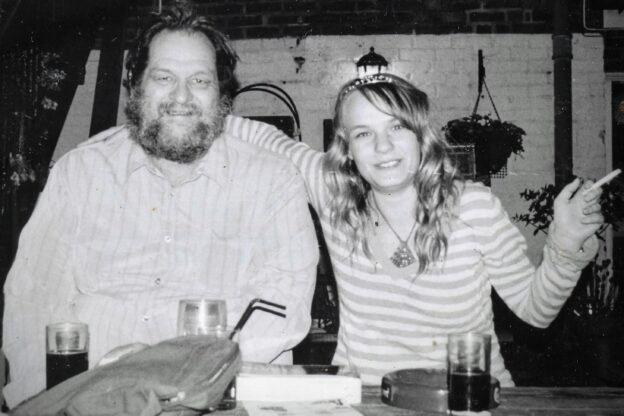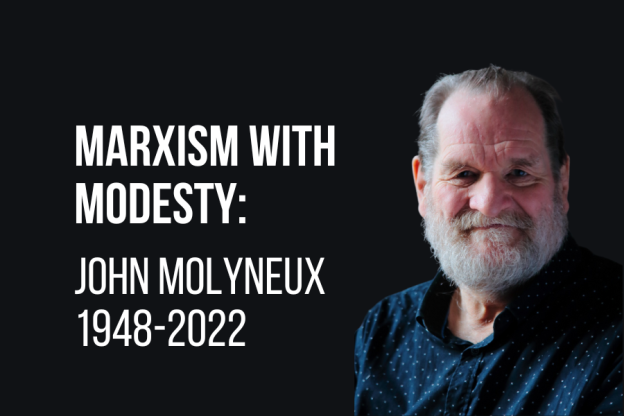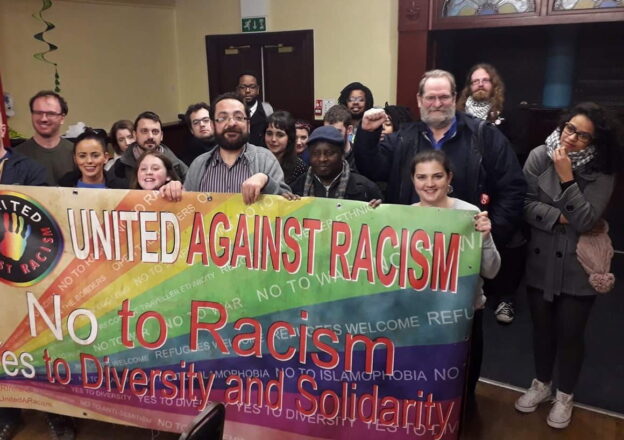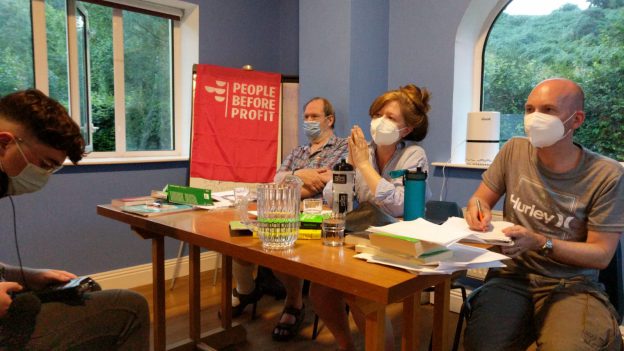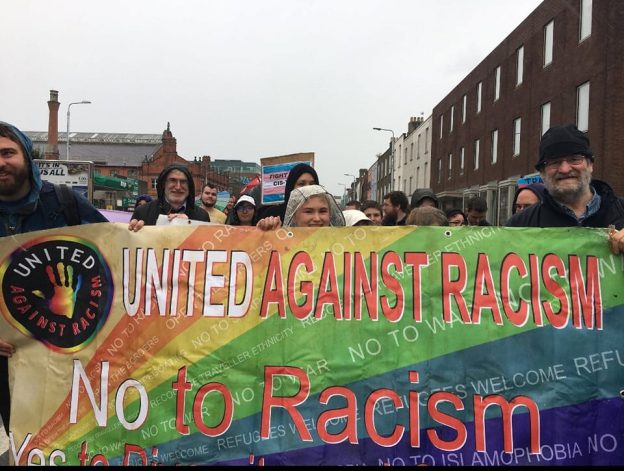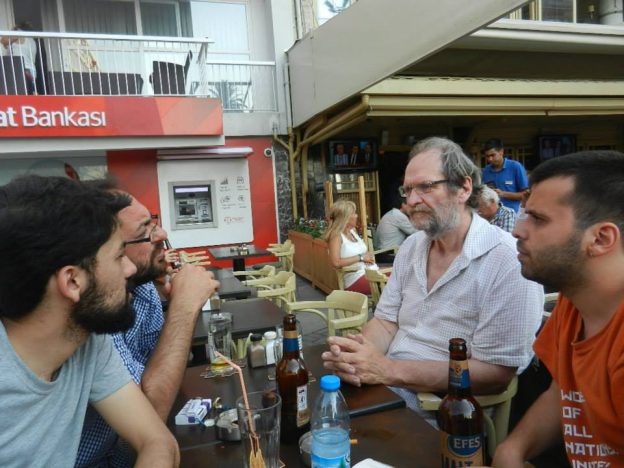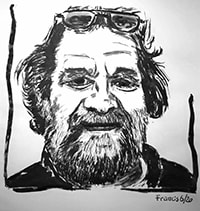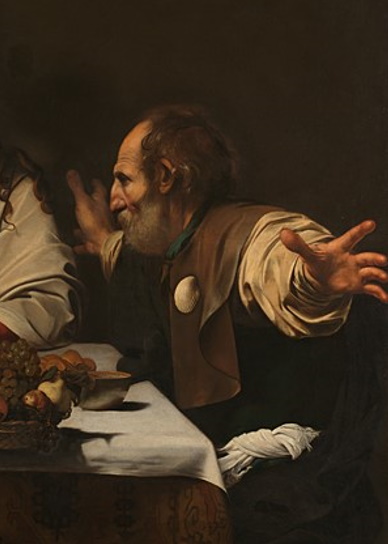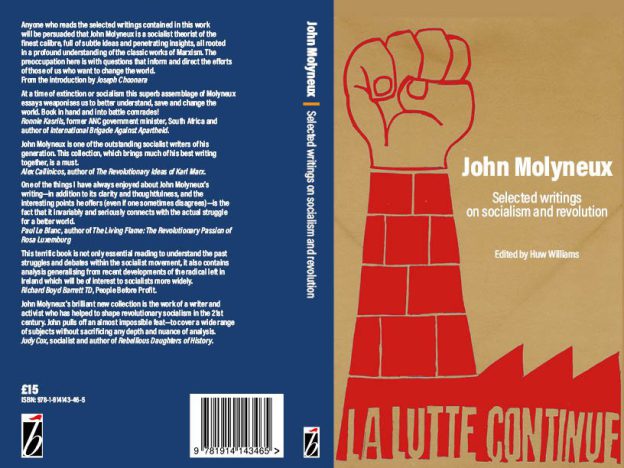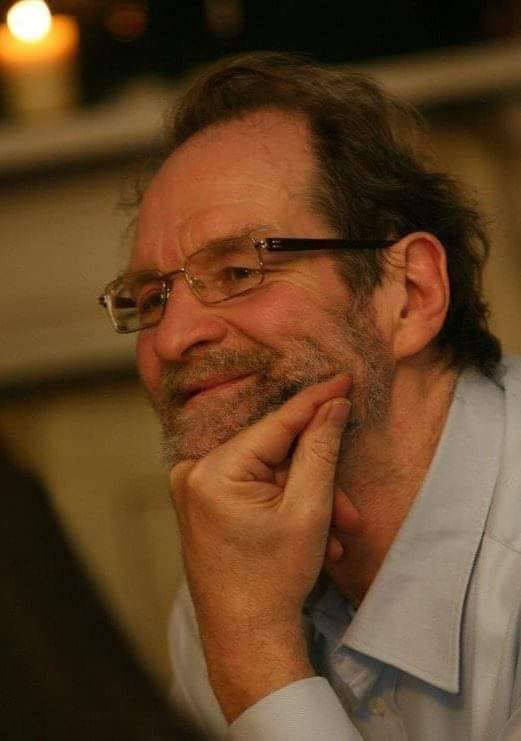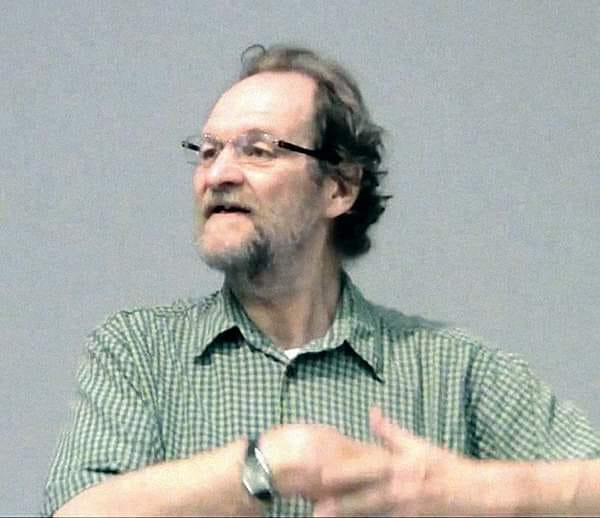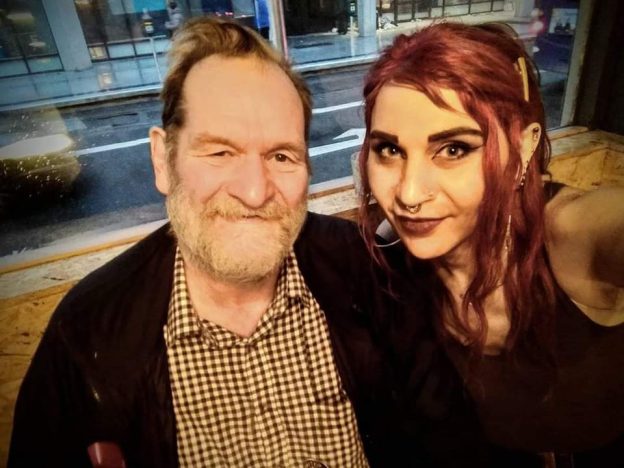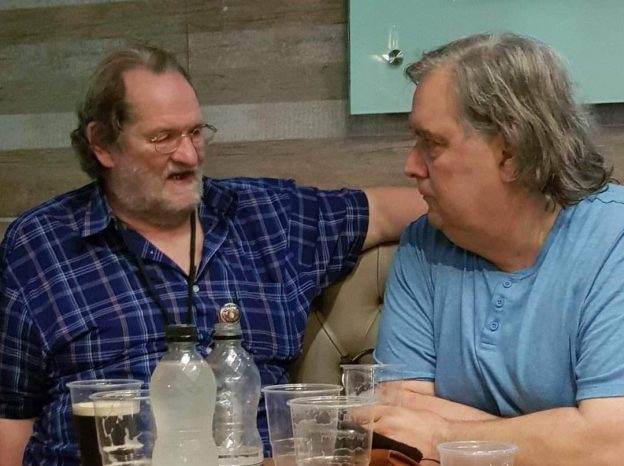Seán Mitchell pays tribute to John Molyneux.
On the 10th of December 2022, the revolutionary Marxist tradition tragically lost of one its finest proponents. 74 years old, 54 of them as a revolutionary, John Molyneux—thinker, writer and revolutionary activist—was a long-distance runner on the road to a post-capitalist world and international socialism. Along the way, he crafted more than a dozen books and pamphlets, published hundreds of articles on a staggering range and array of topics, and helped educate and orientate a whole generation of activists across the globe. John was a one of a kind. Ní bheidh a leithéid ann arís.
John Molyneux’s life was nothing if not interesting. In his own words, his childhood was marked by a “socially isolated, nerdish, certainly very gauche adolescence.” This shielded, middle-class upbringing would unexpectedly come apart after a chance, unusual encounter with the London underworld in the mid-1960s. In a remarkable little autobiographical essay, “Poker in the Strand”, John describes how he stumbled into the peripheral world of underground poker at the tender age of 16. At the En Passant poker club in the heart of London, John encountered a motley crew of characters that read like a casting call for pantomime villains: Brian the Burglar, Johnny the Builder, Chills Tony and Chrissy Doobie, among others. Here Schoolboy John, as he was known to his rival players, took on all comers, and by all accounts did remarkably well despite his youth. John credits this period of his life with breaking him from his social isolation and helping him “to leapfrog over the ‘normal’ teenage scene of dances, parties, pubs, dates—from which I had largely felt excluded by the peculiarities of my sheltered upbringing.”
Equally important to these new social skills, however, was the invaluable lesson John acquired at the En Passant: that “contrary to everything I had been taught at school, neither intelligence nor decency were linked to social status or respectability”. This real-world education in the class nature of society would be dramatically underscored on an ill-advised excursion in 1968, when a besotted John took flight to New York in search of a transatlantic love interest. Without friend or coin, John was quickly compelled to make his way to the notorious slums of the Bowery to seek shelter in a dollar-a-night flophouse. Penniless, broken-hearted and with nowhere to go, John was confronted by the reality of capitalist degradation in the urban cauldron of the wealthiest nation on the planet. It was amidst the visceral, abject poverty of the Big Apple that John first encountered radical ideas, including his first introduction to Marxism. The disparities he witnessed in New York stayed with him: “the corporate wealth of the sky scrapers and Madison Avenue counterposed by the utter degradation of the down-and-outs on the Bowery—both shocked me and resonated with the radical ideas I had recently encountered. I also grasped, half intuitively, that these two poles were two sides of the same capitalist coin—of the same alienation as I would later learn from Marx. Capitalism, I decided, was simply unacceptable; I would become a socialist.”
John was very much a 68’er, indelibly shaped by the once-in-a-generation unloosening of global political ferment and social upheaval. Back in Britain John enthusiastically threw himself into student politics and the Vietnam solidarity campaign, and was an active participant in the famous anti-war demonstration in Trafalgar Square that year. Luck may not have been on John’s side during his trip to New York, though it may have played a role in delivering him to Paris in 1968. The Parisian revolt was in full-flow when John arrived there in May, less than a week after the unprecedented general strike involving ten million workers. John got his first glimpse of the tectonic potential of revolution on this trip, and was awed by the transformative power of an organised working class eager to seize the wheels of history. “Having seen 1968,” he wrote in retrospect, “I can never say, ‘It can’t happen’.”
On his return to England John was recruited to the small but growing ranks of the International Socialists (IS) by its founder and animating force, Tony Cliff. Cliff’s theory of state capitalism distinguished the IS from the many groups on the Left that looked for inspiration to the repressive, unequal societies of the former ‘communist’ states, and provided a basis for the revival of a politics of ‘socialism from below’. IS was a unique organisation: classically orthodox in some ways—especially in its insistence on the centrality of the working class in its own emancipation—but iconoclastic in its break with some of the hallmarks of an insular Trotskyism. To his credit John was drawn to a group that upheld a lively and serious intellectual culture, but which also insisted that its membership—student recruits no less than others—should “turn to the workers” and make their way to the factory gates.
John would settle in Portsmouth where he taught as a lecturer at Portsmouth Polytechnic and later at the University of Portsmouth. He had two children, Sara and Jack, with his then partner Jill Molyneux. John would establish himself in these years as one of the best writers in the IS tradition. The politics John absorbed in the IS—of socialism from below, a resolute opposition to oppression in all its forms, that the emancipation of the working class must be the act of the workers themselves—served as the foundation-stones for his thinking over the next 54 years. As a writer, John made his own enormous contribution to the furtherance of that tradition. His first book, Marxism and the Party, remains a tour de force and should be republished for a new generation of activists. In it, John demolishes many of the myths of party building perpetrated by Stalinists and social democrats alike, and provides a thorough, if critical, exposition of the theory and practice of key figures in the Marxist tradition on the problem of organisation. Marxism and the Party built upon important contributions from others in the IS tradition on the question of revolutionary organisation: not only from Tony Cliff—whose influence is evident throughout the study—but also those of Chris Harman and Duncan Hallas. But without doubt John was also making his own unique contribution: his identification of the concept of hegemony in Lenin’s theory of the party, for example, was something that had largely gone without comment in previous works in the IS tradition.
John’s follow-up, Leon Trotsky’s Theory of Revolution, proved a more controversial affair. John closely identified with Trotsky, going as far as to call him his hero, and in the book he offers a spirited defence of the “Old Man’s” contribution. But hagiography was not for John, however, and he scandalised much of the Trotskyist left with a series of sharp criticisms. In particular, John was highly critical of what he called “the politics of prediction”—Trotsky’s unmistakable habit of forecasting the course of events. John acknowledges that on many occasions Trotsky was borne out by developments—not least in his prophetic warnings about the rise of fascism or the fate of the Spanish Civil War. And of course for John and the IS in general it was Trotsky, and not Lenin, who had correctly predicted the development of the Russian Revolution—not as a series of neatly defined stages marked by an extended period of capitalist development, but as an uninterrupted process of permanent revolution. Having acknowledged these strengths, John proceeds to list a whole array of occasions in which Trotsky’s predictions fell wide of the mark. His argument was that these were not simply errors of fact, but a product of a mistaken method, rooted in a teleology that Trotsky carried over with him from the Second International. A case could be made against John’s conclusions, of course, but his willingness to subject even his heroes to sober, critical scrutiny underscored the kind of undogmatic Marxism that he was committed to.
John had a rare ability to deconstruct complex theory and repackage it in a succinct and accessible form. This was evident in his next book, What is the Real Marxist Tradition?, a relentless dissection of the countless shortcuts to socialism offered by adventurers and reformists alike. Given the breadth of the subject matter, you could forgive an author for getting lost in the weeds on the many “isms” he was critiquing. Not John: the book remains a masterpiece of clarity and nuanced simplicity, and an intellectual reflection of the method he learned from Tony Cliff: discard what is secondary and seize “the key link in the chain of development”.
John’s was a Marxism with modesty: he wrote in clear, concise prose, without hint of academic pretension or scholastic obfuscation, was willing to learn from the experience of workers and always attentive to the practical problems facing activists. In some respects, this style was quintessential John—an extension of his own innate modesty and personal generosity—but it was also a product of the activist Marxism of the IS tradition that had trained him. John’s acumen as a great populariser of socialist ideas is unquestionable, and was luminously present in two further works, Arguments for Revolutionary Socialism and The Future Socialist Society. It cannot be understated just how critical these works were for training a whole generation of activists. As the great James Connolly might have said, reading John Molyneux was socialism made easy.
Like many great Marxists, John’s intellectual interests had a polymathic scope: he was capable of offering sophisticated and incisive commentary on a breath-taking range of topics, including politics, history, ecology, literature, organisation and philosophy (though he tended to leave sustained works of political economy to others in the IST). He was particularly keen to offer a framework for understanding questions that vexed activists, providing a Marxist take on topics that ranged from political correctness to the relationship between Marxism and religion. I found his essay Is Marxism Deterministic? to be particularly useful and illuminating, especially given the opaque and many-headed nature of disputes on the matter.
John was also an avid polemicist, and dipped his toe into a number of debates—including the nature of women’s oppression and the question of party democracy—some of which put him on the wrong side of the leadership of the British SWP (as IS was known after 1977). John was, to be sure, fiercely proud of the IS tradition. In his home, he had collected all the books written from this perspective on a single bookcase. It was an impressive sight, and he would show it off to visitors as someone might display their trophy cabinet. Much as he was proud of his party and tradition, however, by nature and method John was every General Secretary’s worst nightmare: forever asking awkward questions, pointing out the flaws in the organisation, and challenging what he saw as wistful exaggeration on the part of leadership.
John later told me that one sect or other had dubbed him a “loyal oppositionist”—the tag was conceived as an insult, no doubt, but John wore the moniker with pride. Overbearing leaderships might well be the curse of democratic centralism, John would keenly admit, but the penchant of individuals and groups to quit and form a new party at the first hint of disagreement hasn’t always helped matters either. The causes of splits and sectarianism on the left are varied and complex and can’t be easily reduced to facile generalisations. But it does strike me that if James P. Cannon offered the model for organising and winning a faction fight, then perhaps John Molyneux provided a model for how to behave when you end up on the losing side in an argument.
In 2013, John confounded expectations by backing the British SWP leadership during a particularly severe and protracted crisis. Even here, John displayed a willingness to learn from experience, later confiding that the #ibelieveher movement in Belfast had recast how he thought about the matters in dispute. John was a sweet and gentle man, with a very sensitive demeanour, whose feelings could sometimes be easily hurt. But he was very much the opposite of the many toytown Leninists of his generation, who presented a hard radical exterior only to crumble when times get tough. By contrast, John wore a soft and sensitive exterior, but was tough as old boots at his core. He was not afraid to disagree with the party line, but he could also take criticism and admit he was wrong when necessary. He had the character of a true Bolshevik, in other words.
Indeed, John carried the highly unusual talent of being able to happily regale listeners with tales from the times he took a licking in debates, especially when they involved his long time mentor Tony Cliff. During one such debate at an SWP party conference, Cliff rose to challenge him and said: “John Molyneux has written an excellent book on Marxism and the Party. He should read it sometime.” Molyneux was still sniggering his way through retelling this story 40 years later. He would also reminisce about one of Cliff’s favourite jibes: whenever John wavered on this or that question, Cliff would tease him for having a “Hamlet complex.” Cliff, who was steeped in the Marxist classics, had almost certainly lifted this jab from Trotsky’s appraisal of the Menshevik leader Martov. When I pointed this out to John many years later, he simply chuckled: “Yes that’s right; Cliff knew Trotsky’s writings very well.”
John moved to Ireland in 2010 to live with his partner Mary Smith: a lifelong socialist Dub with familial roots in Irish radicalism stretching back to the Easter Rising. In theory, this move marked the beginning of John’s retirement. In practice it would prove to be the most productive and enjoyable stint of his political life. From his new home in working class Dublin, John penned a string of well-honed studies published in quick succession, including a Marxist critique of anarchism and a timely socialist analysis of the media. Particularly useful was his little introduction to Marxist philosophy, The Point is to Change It. This remains, for my money, the best and most accessible introduction to a dense and multifaceted body of work. Every activist should have it on their shelves.
John would also return to the familiar ground of the legacy of the Russian Revolution with his book Lenin for Today. In it John had two targets in his crosshairs. The first were those on the radical left bedazzled by the experience of SYRIZA and busy saying their farewells to Lenin, convinced that the Bolshevist paradigm had little to offer contemporary activists. John argued with great élan that those who were discarding a supposedly quaint and discredited Leninism had merely picked up an even older and repackaged evolutionary reformism. Distant in time as the Bolshevik experience might be, John insisted that there was no getting round the question of state power that Lenin had encountered a century ago. The ‘reform or revolution’ debate was far from settled.
The second and less obvious targets were those who’d remained formally committed to the concept of a revolutionary party, but who had grown conservative in their estimation of what that could or should look like. Lenin had always insisted that the nature of a party organisation must fit the concrete nature of the context it confronted. A revolutionary party was required, John insisted, but Leninists should be open to its precise shape and structure in a new period. John pointed to the challenge of social media, the potential of revolutionary intervention in elections, and the experience of the radical left in Ireland in building transitional parties. When writing the book, John predicted that its publication would generate controversy among many of his longtime comrades, and seemed disappointed when this failed to materialise, even if the work proved to be an invaluable tool for educating a new generation of socialists.
In Ireland, John had the opportunity to return to one of his great passions: art and culture. Here was a writer who tried his hand at a Marxist exposition of Tolkien’s Middle Earth, provided a stimulating materialist explanation for the profound beauty of the Sistine Chapel, and explained with great sophistication why we should all be bowled over by the artistic power of Tracey Emin’s messy bed. His lifelong engagement with art culminated in a punchy little collection titled The Dialectics of Art, a lively and engaging commentary on a wide range or artworks and artists. In this study, John expanded on his own idiosyncratic theory of art, which developed from a quip by Karl Marx, categorising art as a form of “unalienated labour”. After the publication of Dialectics of Art, John spent many hours replying to critics of this concept. Taxonomological considerations aside, John’s theory grasped better than most critics just what art told us about how an unalienated labour and an emancipated society might look: every artist a worker; every worker an artist. There might well be unresolved holes in John’s theory of art as unalienated labour, but he grasped better than most the heart and soul of the matter.
As a member of PBP and the SWN, John quickly became a leading figure on the Irish Left, sitting on the leadership body of the latter. He would often repeat to me that he was astonished that in his first leadership meeting he had opposed a proposal by Kieran Allen and won the vote. This wasn’t a particularly remarkable occurrence—the SWN’s long-suffering leader found himself in a minority on many occasions—but John took it as an early sign of healthy revolutionary organisation, whatever its faults. John was the organiser of the party’s Marxism event from 2012-2014, the editor of its former paper Socialist Worker, and an author of many of its perspective documents. John supported the SWN’s recalibration into a network inside PBP, but always insisted on the need to train and recruit revolutionary socialists. John also supported the ending of the SWN’s old ‘slate system’ for elections, which he had always opposed. One consequence of this was that John himself lost his seat. True to form, he took the loss on the chin and remained active, returning to the leadership at conference the following year.
What really drove John during the last decade of his life was the question of environmental catastrophe. John minced no words about the species-threatening potential of climate change and was an avid participant in the emerging climate movement. He persistently urged the left in Ireland and elsewhere to put environmental questions front and centre in everything it did—including by principally identifying itself as an ecosocialist current—and was keen to reframe Marxist ideas in a manner that would strip it of any lingering “productivist” trappings, opening it up to a whole new audience of young and enthusiastic climate activists. John also held hope that the totalising effect of climate change on humanity and its systemic and cross-border nature would give birth to a renewed radicalism and internationalism. Just as World War One was the midwife of the rebirth of international socialism; so too could climate change realign and reinvigorate the contemporary revolutionary left. As ever, John put his money where his mouth is, conceiving and founding a new Global Ecosocialist Network along these lines.
John will be principally known on the International Left as a theorist. This is understandable. It is difficult to understate, however, just how much activism he was involved with. He was an active member of his branch, participating in leafleting, postering and door knocking. He sat on the steering committee of the Irish Anti War Movement and Unite Against Racism, and was active in Extinction Rebellion and the founder of the Global Ecosocialist Network. His partner-in-crime in these endeavours was invariably Memet Uludağ, one of John’s closest friends and an important Marxist leader in his own right. They were in some respects an odd couple, but they complimented each other very well: John’s steadying hand, Memet’s seemingly boundless energy. They burnt the candle at both ends, no doubt, but at times generated the necessary glow to see us through some very dark situations. Just as sinister forces were gathering in Dublin on the far right of late, the pair had again sprung into action, collaborating to organise the anti-racist resistance with great urgency.
John continued his writing in Ireland. He published a short PBP pamphlet on the subject of ‘people power’ in light of the water charges movement, a further PBP pamphlet on climate change and another that he co-authored with Jess Spear on Ecosocialism. Coming around, in some respects, to where he had begun, the last pamphlet he published before his untimely passing was on the legacy of Stalinism and the need for socialism from below. Critically, John founded and edited the Irish Marxist Review (IMR) and edited it for over a decade. The IMR provided a space for a cast of established socialist intellectuals to ply their trade: Brian O’Boyle, Goretti Horgan, Marnie Holborow, Kieran Allen, and Brian Kelly among others. And it also attracted contributions from high profile leftists outside of the Irish Left, notably John Bellamy Foster, Dave Zirin and a very generous Mike Davis. Crucial too was the space the IMR provided for a new generation of writers in Ireland, including Matt Collins, Alexandra Day, Becca Bor, Ivanka Antova, Fearghal MacBhloscaidh and Somhairle Mag Uidhir.
John was a master of writing in every respect except one: proofing. Even here, his shortcomings were rooted in his own anxiety about progressing the group. Trotsky once characterised Lenin’s disposition as being driven by a “restrained impatience.” John was a bit like that too, especially as he got older. There wasn’t time for microscopic copy edits or several rounds of proofing: “Get the edition out!” he would say. Not long before he passed, he remarked to a comrade in Belfast about how many articles he was working on, how many more he wanted to write, and just how little time he had to do it. John didn’t need to possess powers of clairvoyance to know that time was precious. He had so much left to say and so much to offer. Even after 54 years of activism, his time was cut short.
In the far reaches of my memory, I have an abiding image of John that has stuck with me. Several years ago, I was arriving into Dublin on the train at Connolly station, preparing for some meeting or other. It was a bitterly cold day, with snow covering all but the gritted roads. And there was John, in a long frayed coat and monkey hat, lumbering against the current with a fistful of scrunched up posters, duly affixing them to every lamppost in sight. A man of his stature—still more a man of his advanced age and general health, could easily have passed the job on to someone else for the day. But such options rarely occurred to John, and that was the measure of the man: every inch a revolutionary; selfless and dedicated, principled to the very end.
As I came down the steps of Connolly station to the road that day, I called out to John. He didn’t call back; the wind was carrying my voice in the opposite direction. No matter I thought, I’ll see him later at the meeting. And now that hush is permanent—we will not hear his words of encouragement again, nor reach for his measured advice in times of uncertainty. Material reality determines in the final instance; John knew that better than most, and we are all the better for having known him. I will miss him terribly. Slán go fóill, a chomrádaí.

